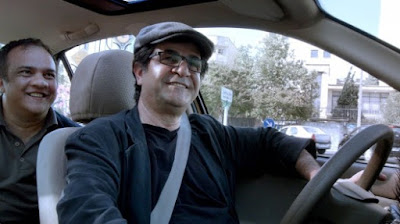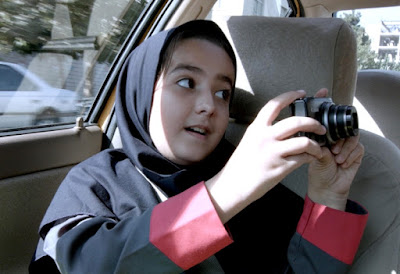The difficult Kafkaesque conditions for the intellectuals
and the financially insecure in Iran discussed in Taxi are indeed very real.
I have visited Iran several times and therefore I have seen
it all first-hand. You do not encounter beggars but it is only natural that economically
weak families exist in Iran. In the film
Taxi, too, you don’t see beggars but
there is a conversation about Iranians being publicly hanged for petty crimes
and of a husband-wife duo wearing masks taking to mugging of their richer neighbours
because of their pecuniary compulsions. The film ends with
thieves/plain-clothed policemen on a motorbike ransacking the “taxi’s” cameras.
Anyone who criticizes the Iranian government is perceived to
be a foreign spy and brutally interrogated, while blindfolded, in notorious
prisons. In his film Taxi, the director Jafar Panahi claims that
he himself underwent a similar situation and that he is still hoping to one day
identify his interrogator by his voice. In the movie Taxi, the Iranian prisons are referred to tongue-in-cheek as “Paradise”
by a famous Iranian human rights lawyer, Ms Nasrin Satoudeh (the flower woman),
who travels in the Panahi driven “taxi.” She explains that once you are
released from prison, your neighbours and friends treat you so differently that
you wish you were back in prison. She would know because she was there herself.
Ms Satoudeh has represented prisoners and political activists. Her impressive
list of clients includes the Nobel Prize winner Shirin Ebadi.
 |
| Director Panahi drives his taxi in Teharan's streets with a camera on the dashboard, while a pirated CD hawker engages him in a conversation on films |
Everything discussed in the movie is real. My heart goes out to the
people of Iran where the best works of Iranian cinema are banned and good
foreign cinema rarely shown. My favourite Iranian film Bitter Dreams, a 2004 debut feature film by Mohsen Amiryousefi,
was banned within months of it being shown at the Cannes film festival and
awarded the Camera d’Or (the award for best cinematography) and subsequently most
cineastes are not even aware of that path-breaking film’s existence or the unique
capability of the young director.
Now Panahi is different. He makes very interesting films. He
claims he is hounded by the Iranian authorities but yet continues to make
films, one after the other, openly on the streets of Teheran. It cannot be that
he has accomplished it without people noticing his filming activities in public
areas. Iran is a nation, which has lots of cops in civilian clothes and a slice
of its population is ever ready to report on activities that would please the
government machinery.
Now Taxi is a
laudable work--including a discussion of males wearing ties in public (I have
not spotted a single Iranian male wearing a necktie in Teheran, but two people
in Taxi wear ties, Panahi's friend who
has been mugged and a just-married bridegroom), the human rights lawyer Ms Satoudeh (the flower woman) referring to
prison tales after she herself was an inmate of the notorious Evin prison, pirated film CDs of American, Japanese and Turkish films being hawked
surreptitiously on the streets of
Teheran--all laudable, realistic cinema.
Or is it? In Taxi,
the taxi driver Panahi is concerned that his two women passengers with a
fishbowl will wet his backseat. When the fishbowl does break by accident,
Panahi is not concerned about the water or the broken glass. The camera angles
of the sequence with him helping the ladies saving the lives of the fish could
not have been taken from the dashboard camera. Evidently there were more
cameras (and camera persons) used than we are expected to believe.
 |
| Two women with a glass fish-bowl enter the taxi. Where is the camera? If it is positioned outside the vehicle, were there regular cinematographers at work? |
We are supposed to believe Panahi’s friend who was mugged
has captured electronically some evidence of that event on his electronic
notebook that he shares with Panahi, the contents of which we don’t get to see.
We just see Panahi’s expressions while viewing it. Are we expected to conjecture the mugging was
caught on camera? Further, are we expected to believe Ms Satoudeh and Mr Panahi
could drive around Teheran without raising suspicions of a film being made,
when Panahi was banned from making films in Iran?
I have actually shaken hands with the director in my city
when he was chairing a film jury. He appeared sullen and unfriendly. In the
movie Taxi, you see a charming, ever-smiling
and friendly Panahi. Which is the real Panahi? In my opinion, the Berlin film
festival ought to have bestowed the Best Actor award for this film not just the
Best Film!
 |
| Candid videoography by Panahi's niece taken within the taxi (She was present in Berlin to pick up the Golden Bear on behalf of her uncle) |
As in Panahi's The
Circle (2000), the subject of Panahi’s film is totally laudable once again in Taxi. But is there an implicit
collusion between Panahi and the Iranian authorities? How much of Taxi is spontaneous? Probably nothing. Panahi, who was not allowed to make a film by
the Iranian government, makes a film (or several films critical of the state of
affairs in the country) and gets away with them. Panahi’s niece captures on camera a rag
picker picking up some cash dropped by a newly-wed groom. Are we to believe that photographic evidence will
go unpunished in Iran, however trivial it is? Now that is intriguing.
P.S. The film won the Golden Bear at the 2015 Berlin film festival and the audience award at the Mumbai international film festival. Amiryousefi’s Bitter Dreams (2004) and
Panahi’s The Circle (2000) are discussed on this blog. Other reviews
of several important Iranian films (and those co-financed by Iran) on this blog can be found by clicking here. However, the film Taxi is built on the ideas first introduced by Abbas Kiarostami in his earlier film Ten (2002).
